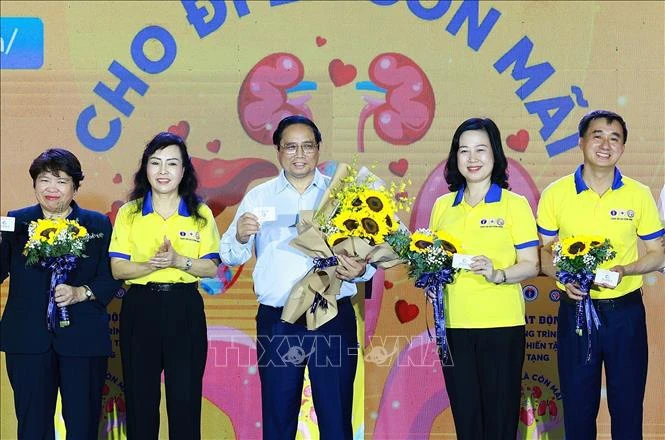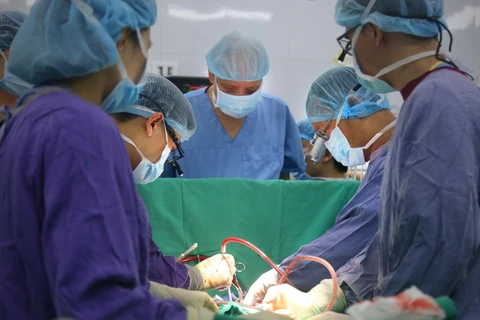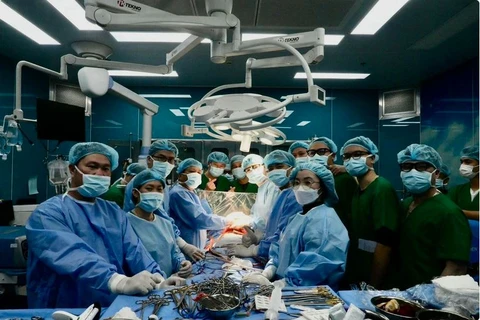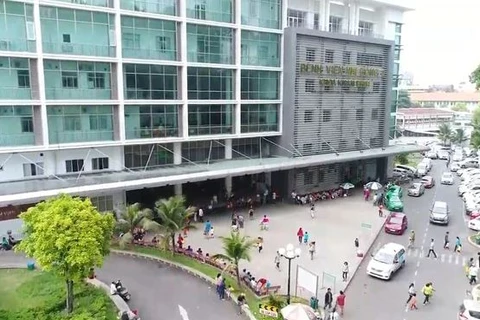
Hanoi (VNA) - Prime Minister Pham Minh Chinh on May 19 called on all Vietnamese adults, regardless of gender, ethnic groups, religion, or region, to register as an organ donor.
He made the call at a ceremony to launch the organ and tissue donation campaign at the Vietnam-Germany Hospital in Hanoi by the Ministry of Health, the Vietnam Red Cross Society and the Organ and Tissue Donation Association.
The PM stressed that donating organs and tissues is one of the most meaningful presents one can give to others. Thousands of people in Vietnam have received successful organ transplants and their lives have been spared because of the generosity and sharing of good-hearted people.
He said over the past three decades, the organ transplantation service has made remarkable progress thanks to incentive policies of the Party and State, efforts by medical staff, public support and, in particular, the noble sacrifices of organ donors.
Since performing the first successful organ transplant 30 years ago, Vietnam had become an expert in transplanting all kinds of organs and it recently carried out numerous multi-organ transplants.
The PM said that the Party and State always pay particular attention to health care, especially emerging fields using modern technology such as organ donation and transplantation and had put in many mechanisms, policies and laws to support this work.
“This is a bright spot, a source of pride, a testament to outstanding progress, demonstrating the level of expertise, deep technical expertise and diverse experience of organ transplant specialists, Vietnamese organ transplant industry in the country's healthcare sector,” he said.
The leader said May 19 – President Ho Chi Minh’s birthday – should be a day of gratitude for organ and tissue donors.
The Prime Minister commended the leaders of the Ministry of Health as well as Vietnamese health care workers, particularly the professors, physicians, officials and medical staff working in the field of organ transplantation, who exhibit a strong sense of responsibility and are continuously pursuing new research for the goal of "treating diseases and saving people."
But he expressed his concern about the restricted sources of organ donation after death, or brain death and the fact that the demand for organ transplants is still not being met.
“Everyone's health is the most valuable resource for both the individual and the entire society,” he said.

He urged ministries, sectors and localities to step up their work in information technology, to make it quicker and easier for people to register for tissue and organ donation so that everyone who is eligible can be listed.
He added that because organ donation is entirely voluntary and not done for financial gain, all acts of commercialisation, including the buying and selling of human tissues and organs must be outlawed.
At the launch ceremony, PM Chinh and leaders of the Government’s agencies were among those who registered as donors, raising the total so far to 3,812.
In 2022 and 2023, Vietnam performed more than 1,000 operations including kidney, liver, heart and lung transplants and today, it is the country with the highest number of organ transplants per year in the region.
Living donors provide more than 94% of the organs used in transplants.
Right now, around 86,000 people—or 0.086% of the population—have registered to donate organs after their death.
Before 2023, the country had only five hospitals that carried out the diagnosis of brain death resuscitation for organ tissue donation, but now it has been implemented in nine hospitals. The Ministry of Health has built a nationwide network of donor hospitals with 68 hospitals./.






















